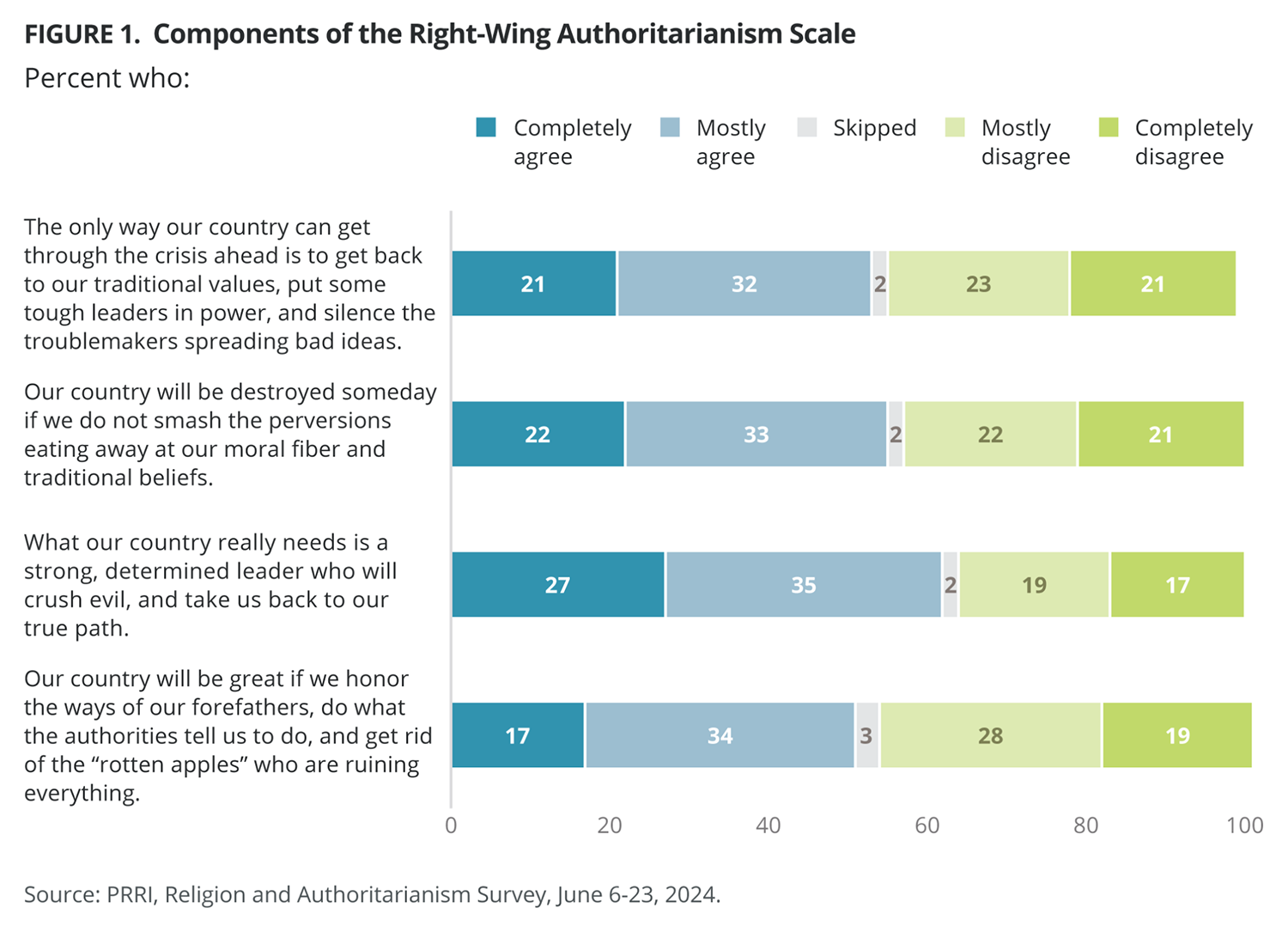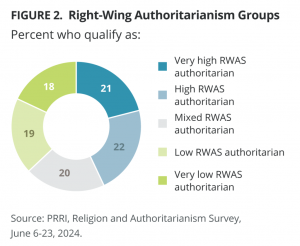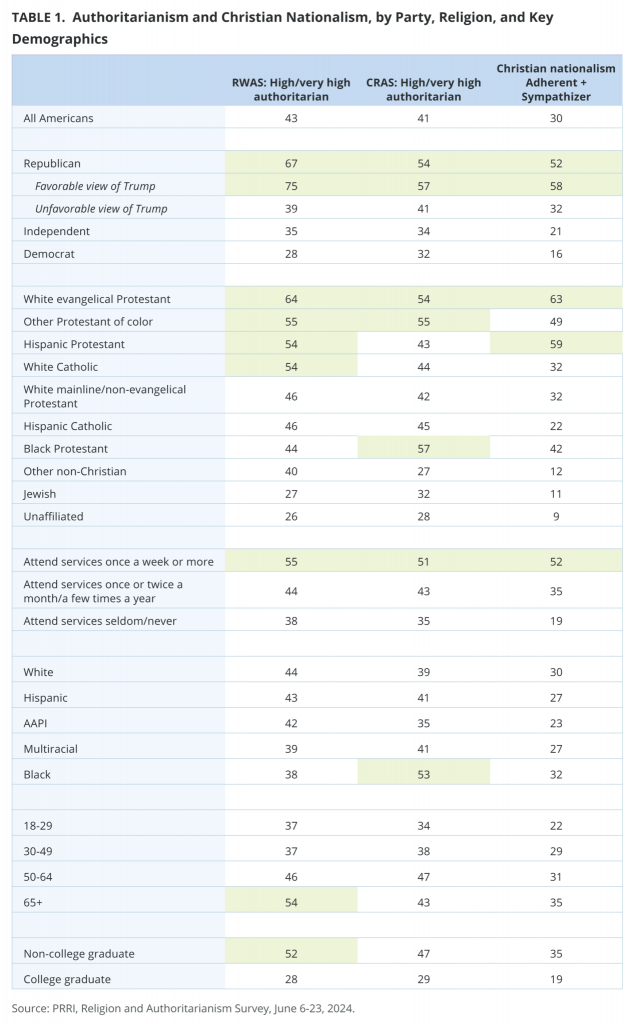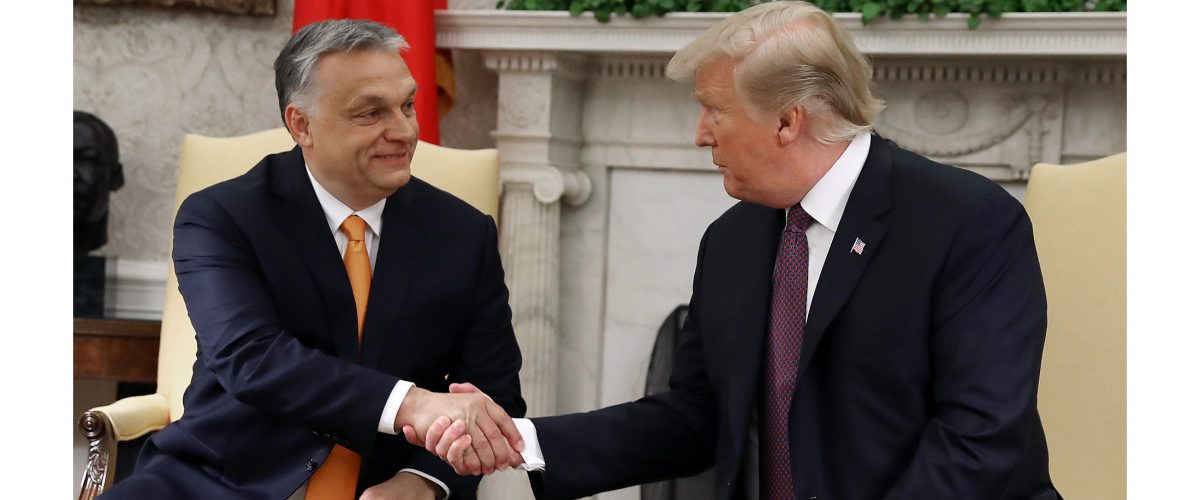Among all Americans, Republicans and white evangelical Protestants are most susceptible to authoritarian views, according to new national polling from Public Religion Research Institute.
Among that group, those most susceptible to authoritarianism are Americans who hold favorable views of Republican presidential candidate Donald Trump, PRRI said in its Sept. 10 report.
That report was released just hours before the presidential debate between Trump and Democratic presidential candidate Kamala Harris. During that debate, Trump praised Hungarian leader Viktor Orbán, widely labeled an authoritarian dictator.

Donald Trump speaks during a presidential debate with Kamala Harris at the National Constitution Center, Tuesday, Sept.10, 2024, in Philadelphia. (AP Photo/Alex Brandon)
During the Tuesday evening debate, Trump attempted to counter claims by Harris that other world leaders are laughing at Trump.
“Let me just say about world leaders, Viktor Orbán, one of the most respected men, they call him a strong man. He’s a tough person. Smart prime minister of Hungary,” he said.
Then Trump spoke of imaginary people asking Orbán, “Why is the whole world blowing up?”
“Because you need Trump back as president,” he reported Orbán saying. “They were afraid of him. China was afraid.”
Trump said he doesn’t like to use the word “afraid,” but he was “just quoting him.” Trump claimed Orbán said China, North Korea and Russia are “afraid of him.”
Orbán is one of a network of authoritarian dictators Trump has spoken warmly of in the past and with whom he has been compared repeatedly.
PRRI’s new data is the latest in a stream of commentary on Trump’s authoritarian inclinations, including his claim that he would be dictator only on Day One of a new administration and that he would jail his political enemies and pardon his supporters convicted of crimes on January 6.

Jones elaborates on data
PRRI founder Robert P. Jones happened to be scheduled to speak to a gathering of religion journalists and researchers in New York City the same day as the new survey was released. He took that opportunity to give an overview of the data. That event was a 90th anniversary celebration for Religion News Service.
“There’s been a lot of talk about authoritarianism in the country, rising authoritarianism, particularly in the Trump era,” Jones said. Yet measuring interest in authoritarianism is not easily done, he explained.
 He and his PRRI team studied research done around World War II and the rise of fascism in Europe and crafted their polling strategy with those past events in mind.
He and his PRRI team studied research done around World War II and the rise of fascism in Europe and crafted their polling strategy with those past events in mind.
“When trying to measure a challenging concept like authoritarianism, you don’t want to rely on just one question,” he said. “So what we’ve done is asked a series of questions. In order for somebody to score high on an authoritarian scale, it means they have to answer fairly consistently across all these questions.”
Those four agree/disagree questions are:
- “The only way our country can get through the crisis ahead is to get back to our traditional values, put some tough leaders in power, and silence the troublemakers spreading bad ideas.”
- “Our country will be destroyed someday if we do not smash the perversions eating away at our moral fiber and traditional beliefs.”
- “What our country really needs is a strong, determined leader who will crush evil, and take us back to our true path.”
- “Our country will be great if we honor the ways of our forefathers, do what the authorities tell us to do, and get rid of the “rotten apples” who are ruining everything.”
Strongly affirming all four of these propositions gives someone the highest possible rating of endorsing authoritarianism. This set of questions also was balanced with a separate set of questions that focused on more abstract ideas of childrearing. Answers to the two sets of questions produced strong correlation, Jones said. “At the national level, we see a fairly reasonable agreement between these two scales.”
Republicans and evangelicals are outliers
In the new polling results, independent voters look more like Democrats than Republicans, he said. And Republicans who do not support Trump look more like Americans at large.
“We can actually see the influence of Trump on the Republican Party because there’s this big divide between Republicans who have a favorable view of Trump and Republicans who do not have a favorable view of Trump,” Jones said.
Sorted by religious identity, “there’s one group that scores higher than anyone else” on favoring authoritarianism, he continued. “It’s not a surprise, it’s the base, Donald Trump’s strongest base — white evangelical Protestants. It’s nearly two thirds of them who score either high or very high.”
However, they are not alone in scoring high on favoring authoritarianism, Jones added. Majorities of both Hispanic Protestants and white Catholics also say they favor authoritarianism.
Another correlation found in the survey links frequent church attendance with more favorable views on authoritarianism, he said. “Some of that is because that top category is overrepresented by white evangelicals. They tend to be a group that attends” more than others.
‘Resort to extraordinary means’
One of the scariest parts of the survey tracked how many Americans believe “things are so bad we need to resort to extraordinary means. The normal rules don’t apply. The normal norms don’t apply,” he said.
Even though less than a majority of Americans hold the strongest penchant for authoritarianism, those numbers are high enough to be concerning, Jones said. “It’s still more than one in three say the president should be able to limit the influence of other parties. And it’s about three in 10 among that highest group who say the president should be able to ignore Congress and ignore even the Supreme Court while in office.”
He reminded the group of related findings from earlier PRRI surveys. “It’s more than one in three agreeing that true American patriots may have to resort to violence to save the country. It’s about three in 10 who say we may need armed citizens showing up at the polls, even if it makes some other voters uncomfortable. And then finally, it’s nearly three in 10 saying if the presidential election is compromised by voter fraud, everyday Americans need to take actions to ensure the right leader takes office even if it requires violence there.”
“So it’s about three in 10 on this rightwing authoritarianism scale who score high, who explicitly affirm taking violent actions in the upcoming election.”
In PRRI’s written report on the new data, this fact is given another focus as well: “Those who support authoritarianism are nearly twice as likely as the general public to support it. These findings should serve as an important warning as we enter an election season that is incredibly consequential for the health of American democracy.”

RWAS = Right Wing Authoritarianism Scale CRAS = Child Rearing Authoritarianism Scale


